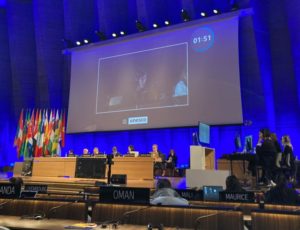IFLA Advocates for Meaningful Engagement with Civil Society, Cultural Institutions and Organisations at UNESCO
18 avril 2024
The UNESCO Intergovernmental Committee (IGC) for the Protection and Promotion of the Diversity of Cultural Expressions (UNESCO’s 2005 Convention) convened for their 16th session from 7-10 February in Paris, France.

During this meeting, the representatives of the bureau, chosen from among national governments who have ratified the 2005 Convention, came together to discuss actions taken to implement the convention. Civil society plays an important role in the 2005 Convention, and so observers are invited to participate and share their perspective with the Member States.
IFLA is a regular civil society contributor to the work of this convention. IFLA’s role is to ensure libraries are being recognised as fundamental actors in protecting and promoting access to cultural diversity. We achieve this by cooperating with partners from other Civil Society Organisations (CSOs) to engage with UNESCO Member States and the UNESCO Secretariat, providing input on their work and helping ensure informed decision making.
Supporting Engagement with Libraries and Library Associations
Recognition of libraries as important partners in achieving the goals of the Convention, and support for them in this work, are outcomes IFLA is striving to achieve through our involvement in these meetings.
In recent years, Parties to the Convention have increasingly noted that it is vitally important to engage with cultural institutions and organisations. IFLA is very supportive of the representation libraries have received.
We were delighted that the IGC heard from the Bibliothèque et Archives nationales du Québec (BAnQ) in a consultation held during their meeting. The library representative shared updates on the many projects they carry out in support of cultural and linguistic diversity.
IFLA took the floor to give an intervention during this discussion. We noted the connection between this Convention and the mission of public libraries as is stated in the 2022 IFLA-UNESCO Public Library Manifesto, which we jointly launched with UNESCO last July.
IFLA stressed to the State Parties that it is important for libraries to have means to make sure their impact is recognised – especially by local and national funders, policy- and decision-makers. We encouraged the Intergovernmental Committee to find opportunities to help cultural institutions and organisations amplify their impact.
However, we highlighted the importance of keeping a global scope, so as to include the diversity of library types, sizes, and national contexts. In this, IFLA offered our ongoing consultation to State Parties.
IFLA is investing in helping our members engage with UNESCO at the national and international levels. We will continue following this discussion and identifying emerging opportunities.
The Role of Civil Society
The 2005 Convention compels State Parties to work closely with civil society actors, like non-profits, non-governmental organisations, and activists.
IFLA cooperates with all civil society organisations involved in the convention to help ensure that our voices and perspectives continue to be considered by State Parties.
IFLA joined other civil society organisations present at this meeting in calling for all civil society observers who have successfully completed UNESCO’s admission process to have the ability to participate. We feel inclusion of all eligible civil society actors is a matter of freedom of speech and inclusion, which we strive to uphold in every space we engage.
We look forward to working with other civil society organisations and with colleagues representing UNESCO Member States in preparation of the 4th Civil Society Forum, coming up in June 2023. We will bring the points raised here to the Forum for further dialogue.
Revisit IFLA’s work during the 3rd Civil Society Forum (2021) here.
Learn more about the 2005 Convention:
Get into the 2005 Convention on the Protection and Promotion of the Diversity of Cultural Expressions
IFLA’s new guide takes a look at the Convention on the Protection and Promotion of the Diversity of Cultural Expressions, why it matters to libraries, and how to put it to use for library advocacy.
This Convention is a commitment at the global level to culture, in recognition of its importance ...